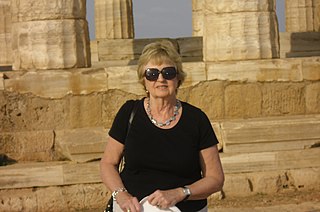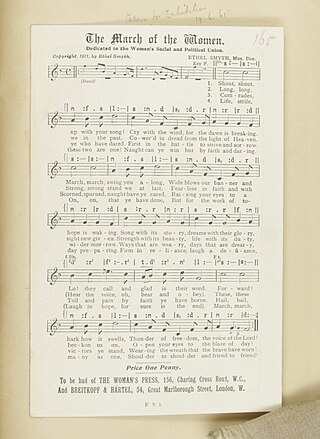Related Research Articles
Feminism is a range of socio-political movements and ideologies that aim to define and establish the political, economic, personal, and social equality of the sexes. Feminism holds the position that societies prioritize the male point of view and that women are treated unjustly in these societies. Efforts to change this include fighting against gender stereotypes and improving educational, professional, and interpersonal opportunities and outcomes for women.

Gloria Jean Watkins, better known by her pen name bell hooks, was an American author, theorist, educator, and social critic who was a Distinguished Professor in Residence at Berea College. She is best known for her writings on race, feminism, and class. The focus of hooks' writing was to explore the intersectionality of race, capitalism, and gender, and what she described as their ability to produce and perpetuate systems of oppression and class domination. She published around 40 books, including works that ranged from essays, poetry, and children's books. She published numerous scholarly articles, appeared in documentary films, and participated in public lectures. Her work addressed love, race, class, gender, art, history, sexuality, mass media, and feminism.

Donna J. Haraway is an American professor emerita in the history of consciousness and feminist studies departments at the University of California, Santa Cruz, and a prominent scholar in the field of science and technology studies. She has also contributed to the intersection of information technology and feminist theory, and is a leading scholar in contemporary ecofeminism. Her work criticizes anthropocentrism, emphasizes the self-organizing powers of nonhuman processes, and explores dissonant relations between those processes and cultural practices, rethinking sources of ethics.

Estelle Sylvia Pankhurst was a campaigning English feminist and socialist. Committed to organising working-class women in London's East End, and unwilling in 1914 to enter into a wartime political truce with the government, she broke with the suffragette leadership of her mother and sister, Emmeline and Christabel Pankhurst. She was inspired by the Russian Revolution and consulted Lenin, but defied Moscow in endorsing a syndicalist programme of workers' control and by criticising the emerging Soviet dictatorship.

The Women's Social and Political Union (WSPU) was a women-only political movement and leading militant organisation campaigning for women's suffrage in the United Kingdom from 1903 to 1918. Known from 1906 as the suffragettes, its membership and policies were tightly controlled by Emmeline Pankhurst and her daughters Christabel and Sylvia; Sylvia was eventually expelled.
The women's liberation movement (WLM) was a political alignment of women and feminist intellectualism that emerged in the late 1960s and continued into the 1980s primarily in the industrialized nations of the Western world, which effected great change throughout the world. The WLM branch of radical feminism, based in contemporary philosophy, comprised women of racially and culturally diverse backgrounds who proposed that economic, psychological, and social freedom were necessary for women to progress from being second-class citizens in their societies.

Saskia Sassen is a Dutch-American sociologist noted for her analyses of globalization and international human migration. She is a professor of sociology at Columbia University in New York City, and the London School of Economics. The term global city was coined and popularized by Sassen in her 1991 work, The Global City: New York, London, Tokyo.
Critical international relations theory is a diverse set of schools of thought in international relations (IR) that have criticized the theoretical, meta-theoretical and/or political status quo, both in IR theory and in international politics more broadly – from positivist as well as postpositivist positions. Positivist critiques include Marxist and neo-Marxist approaches and certain ("conventional") strands of social constructivism. Postpositivist critiques include poststructuralist, postcolonial, "critical" constructivist, critical theory, neo-Gramscian, most feminist, and some English School approaches, as well as non-Weberian historical sociology, "international political sociology", "critical geopolitics", and the so-called "new materialism". All of these latter approaches differ from both realism and liberalism in their epistemological and ontological premises.

Richard Sakwa is a British political scientist and a former professor of Russian and European politics at the University of Kent, a senior research fellow at the National Research University-Higher School of Economics in Moscow, and an honorary professor in the Faculty of Political Science at Moscow State University. He has written books about Russian, Central and Eastern European communist and post-communist politics.

Black Friday was a suffragette demonstration in London on 18 November 1910, in which 300 women marched to the Houses of Parliament as part of their campaign to secure voting rights for women. The day earned its name from the violence meted out to protesters, some of it sexual, by the Metropolitan Police and male bystanders.

Dame Averil Millicent Cameron, often cited as A. M. Cameron, is a British historian. She writes on Late Antiquity, Classics, and Byzantine Studies. She was Professor of Late Antique and Byzantine History at the University of Oxford, and the Warden of Keble College, Oxford, between 1994 and 2010.
This is a timeline of English history, comprising important legal and territorial changes and political events in England and its predecessor states. To read about the background to these events, see History of England.

A movement to fight for women's right to vote in the United Kingdom finally succeeded through acts of Parliament in 1918 and 1928. It became a national movement in the Victorian era. Women were not explicitly banned from voting in Great Britain until the Reform Act 1832 and the Municipal Corporations Act 1835. In 1872 the fight for women's suffrage became a national movement with the formation of the National Society for Women's Suffrage and later the more influential National Union of Women's Suffrage Societies (NUWSS). As well as in England, women's suffrage movements in Wales, Scotland and other parts of the United Kingdom gained momentum. The movements shifted sentiments in favour of woman suffrage by 1906. It was at this point that the militant campaign began with the formation of the Women's Social and Political Union (WSPU).
Susan Pedersen is a Canadian historian, and James P. Shenton Professor of the Core Curriculum at Columbia University. Pedersen focuses on 19th and 20th century British history, women's history, settler colonialism, and the history of international institutions.

A suffragette was a member of an activist women's organisation in the early 20th century who, under the banner "Votes for Women", fought for the right to vote in public elections in the United Kingdom. The term refers in particular to members of the British Women's Social and Political Union (WSPU), a women-only movement founded in 1903 by Emmeline Pankhurst, which engaged in direct action and civil disobedience. In 1906, a reporter writing in the Daily Mail coined the term suffragette for the WSPU, derived from suffragist, in order to belittle the women advocating women's suffrage. The militants embraced the new name, even adopting it for use as the title of the newspaper published by the WSPU.

"The March of the Women" is a song composed by Ethel Smyth in 1910, to words by Cicely Hamilton. It became the official anthem of the Women's Social and Political Union (WSPU) and more widely the anthem of the women's suffrage movement throughout the United Kingdom and elsewhere. Activists sang it not only at rallies but also in prison while they were on hunger strike. Smyth produced a number of different arrangements of the work.

Annie Shepherd Swan, CBE was a Scottish journalist and fiction writer. She wrote mainly in her maiden name, but also as David Lyall and later Mrs Burnett Smith. A writer of romantic fiction for women, she had over 200 novels, serials, stories and other fiction published between 1878 and her death. She has been called "one of the most commercially successful popular novelists of the later nineteenth and early twentieth centuries". Swan was politically active in the First World War, and as a suffragist, a Liberal activist and founder-member and vice-president of the Scottish National Party.
Marika Sherwood is a Hungarian-born historian, researcher, educator and author based in England. She is a co-founder of the Black and Asian Studies Association.
Vera Mackie is an Australian academic who has specialised in Japanese feminism and gender history. As of 2021 she is Emeritus Senior Professor of Asian and International Studies at the University of Wollongong.
References
- ↑ "Row erupts over suffragette tale". 26 January 2007.
- ↑ "Women's History Review Editorial Board". Taylor & Francis Online. Retrieved 29 January 2018.